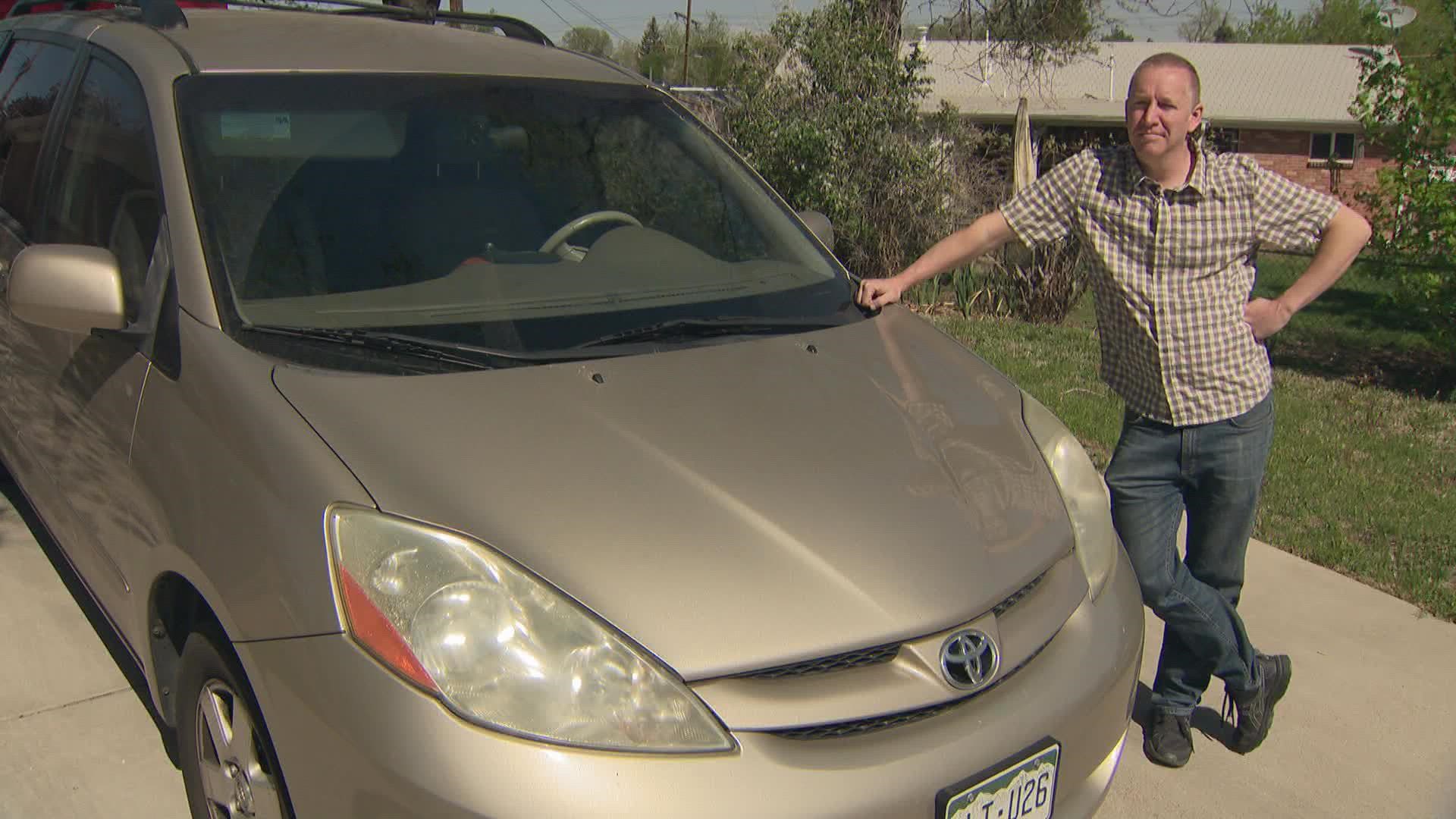DENVER — It might be something you wonder while driving past a golf course: what happens if someone shanks a ball and shatters my windshield?
Robert Adams found out, and it wasn't exactly the answer he'd hoped to get from the City of Denver.
A few weeks ago, Adams was driving down West Florida Avenue toward the city-owned Aqua Golf, a driving range where golfers are supposed to hit their shots into Overland Lake.
Adams' wife and toddler were in the car, and his dashcam was rolling as an errant golf ball careened into the windshield.
"Out of the clear, blue sky came a ball," Adams said. “Just for the last split second I could see it coming our direction, but then it was too late because we were in traffic, and I couldn’t swerve or anything like that safely, so, I just watched it hit, basically."
> Watch the dashcam video:
The dashcam video showed Adams immediately pulled into the Aqua Golf parking lot. Adams said he talked to the person at the front desk of the driving range and decided to file a claim with the city.
The bill to replace the windshield was about $330, Adams said, and he expected the city would be willing to pay. He was wrong.
A couple weeks after filing the claim, Adams received a letter from the Denver city attorney's office. The letter denied the city was responsible because of the Colorado Governmental Immunity Act (CGIA), which limits the city's liability for damages.
"Because damage from a golf ball is not one of the circumstances for which the City may be held liable pursuant to the CGIA, we must respectfully deny this claim and your request for compensation," the letter read.
9NEWS legal analyst Whitney Traylor is not surprised by the city's response.
"Because by simply saying 'we’re not liable' will drive a certain number of people away from even pursuing it," Traylor said.
The CGIA lays out certain situations in which people can sue the government. According to a summary of the CGIA on the state's website, waivers to the law fall into eight general areas:
- Operation of a motor vehicle owned or leased by a public entity, by a public employee while in the course of employment,
- Operation of a public hospital, correctional facility or jail,
- A dangerous condition of any public building,
- A dangerous condition of a public highway, road or street,
- A dangerous condition of any public hospital, jail, public facility located in any park or recreational area maintained by a public entity, or public water, gas, sanitation, electrical, power, or swimming facility and,
- The operation and maintenance of any public water facility, gas facility, sanitation facility, electrical faculty, power facility, or swimming facility by such public entity.
- The operation and maintenance of a qualified state capital asset that is the subject of a leveraged leasing agreement.
- Failure to perform an education employment required background check as described in 13-80-103.9, C.R.S.
Traylor said Adams' case may depend on whether it was foreseeable to the city that golf balls from Aqua Golf would end up in the path of cars on West Florida Avenue.
"If the city knew over and over and over again that balls were going out into the street, that's where the liability could be created," he said. “The city does have some defenses, but the question is, was this foreseeable?"
Adams is not planning on taking legal action -- attorney fees would likely end up costing more than it did to replace his windshield. But Adams does have a suggestion for the city.
"I would like to see them put a net in place to avoid balls going from the range to the road," Adams said.
There is a fence between the driving range and the road, but it's not tall enough to stop every golf ball, like the one shanked into Adams' windshield.
“If it was an injury or something like that, this would’ve been a lot more serious thing," Adams said.
A spokesperson for the Denver city attorney's office said "there is no liability for damages caused by third parties resulting from errant golf ball shots."
The spokesperson could not say how many times people have filed claims with the city over errant golf ball shots from city-owned courses because the city does not track that number.
"I would be shocked if that were the case, because this is potential liability," Traylor said. "They want to keep a very good record not only for the legal liability, but just to keep people safe.”
9NEWS checked out West Florida Avenue near Aqua Golf on Thursday morning and found several range balls nestled up against the curb.
The day after the windshield incident, Adams returned to the scene and retrieved what he thinks was the infamous golf ball.
"I’m pretty sure it was this one," he said, showing off the Aqua Golf range ball marked with the word "floater."
Adams is now stuck with a bill and a golf ball he didn't want.
"I'll probably throw it away and try to forget about this," he said.
SUGGESTED VIDEOS: Latest from 9NEWS

